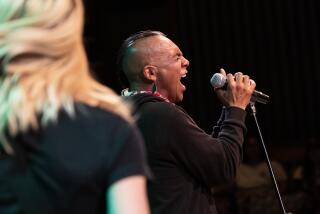High on the Potent Hit of ‘Black Sunday,’ Cypress Hill Cashes In on New Pot Chic : SWEET SMELL OF SUCCESS
- Share via
Unlike certain other leaders in various fields, the members of Cypress Hill most definitely inhaled. And the rap world has never been quite the same.
No pop-music enterprise this side of Jamaica’s spliff-wielding reggae musicians has made marijuana such a central image and issue in its identity as this South Gate trio, and that’s one big reason they have sold a few million albums since hitting the scene in 1991 with their “Cypress Hill” album.
Their newest and second one, “Black Sunday,” entered the pop charts at No. 1 in July. The album package includes a list of the beneficial properties of hemp. And the band’s line of clothing and accessories is emblazoned with the image of the familiar leaf.
The group, which headlines a concert tour of affiliated acts that plays Irvine Meadows Amphitheatre tonight, has also appeared on the cover of High Times magazine and serves as an official voice for the National Organization for the Reform of Marijuana Laws (NORML).
Band members rap about getting high and talk about it in interviews. Prominent on their concert stage is a giant hand holding a joint.
Whether it’s dumb luck or cagey timing, this preoccupation has enabled Cypress Hill--Sen Dog, B-Real and D. J. Muggs--to catch the crest of the biggest wave of pot consciousness in popular entertainment since Cheech & Chong staggered across the nation’s movie screens.
But that’s only the most obvious and sensational aspect of the threesome’s penetration into the rock audience. In a related development, the group has also adapted the iconography of speed metal (check the skulls and graveyard art on the “Black Sunday” package), linking up with that music’s role as the voice of alienated white youth.
It has paid off. “Cypress Hill” has sold more than 1.5 million copies, and “Black Sunday” has nearly matched that total. Significantly, Cypress Hill has expanded beyond the traditional rap audience--when your eyes adjust to the haze at a Cypress Hill concert, you’ll see an audience made up largely of young, white fans.
But if pop-music history has shown one thing, it’s that marketing and images aren’t worth a thing if the music doesn’t come through. And that is the other area Cypress Hill, which took its name from its South Gate neighborhood, has covered.
Some critics say “Black Sunday” doesn’t build much on the framework established on the debut album, but it’s still a potent concoction.
The distinctive Cypress Hill sound creates a claustrophobic, scratchy, hissing, wheezing atmosphere that can make you feel as if you’re trapped in some strange radio band. On a song such as “Insane in the Brain,” they do a pretty good job of giving the impression that they’re really crazy.
It’s all produced by Muggs, who has the makings of an empire-building producer--he also oversees the sounds of the other three acts on the “Soul Assassins” tour--House of Pain, Funkdoobiest and the Whooliganz.
In this disorienting miasma, B-Real’s nasal, rubbery vocals seem to taunt even as he celebrates the weed and Cypress Hill’s other main fetish, guns.
Insane in the brain?
Don’t believe it. How crazy can you really be when you’ve got a worldwide merchandising operation that Nike might envy?
More to Read
The biggest entertainment stories
Get our big stories about Hollywood, film, television, music, arts, culture and more right in your inbox as soon as they publish.
You may occasionally receive promotional content from the Los Angeles Times.









